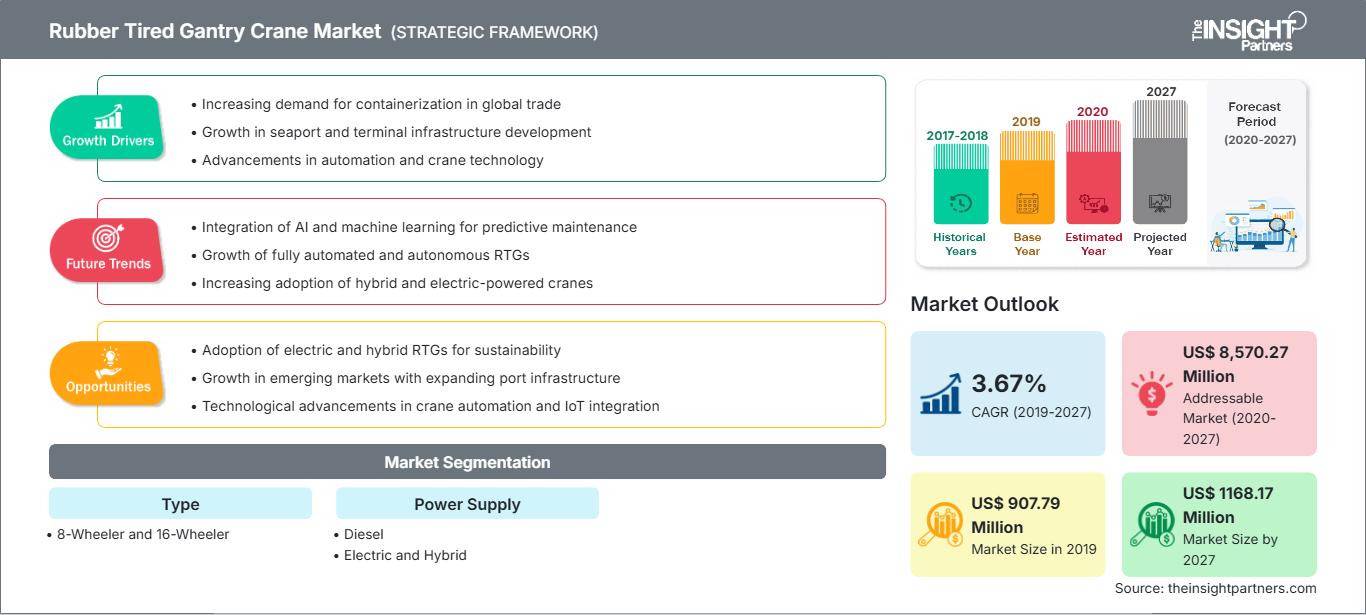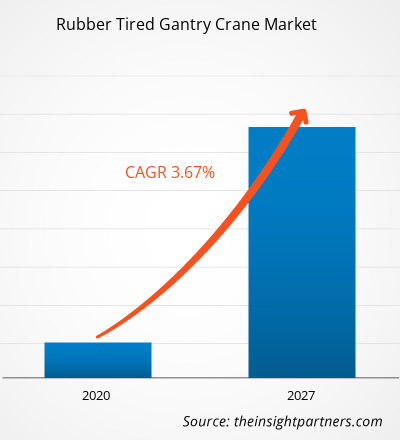고무 타이어 갠트리 크레인 시장은 2019년 9억 779만 달러 규모였으며, 2027년에는 11억 6,817만 달러에 이를 것으로 예상됩니다. 2020년부터 2027년까지 연평균 성장률(CAGR) 3.67%로 성장할 것으로 예상됩니다.
과거에는 개발도상국이 원자재 공급자 역할을 했지만, 무역 구조 변화로 인해 전 세계 개발도상국이 새로운 역할을 맡게 되면서 고무 타이어 갠트리 크레인 시장은 예측 기간 동안 상당한 성장률을 기록할 것으로 예상됩니다. 시장 성장은 중국을 포함한 개발도상국이 해상 무역 수요 증가에 크게 기인하며, 아시아가 가장 큰 무역 지역으로 부상하고 있습니다.
또한, 고무 타이어 갠트리 크레인 시장은 항만 개발을 위한 정부의 우호적인 정책에 힘입어 성장하고 있습니다. 항구는 제대로 운영될 경우 경제의 바퀴가 됩니다. 오늘날 항구의 목적은 제한적인 것이 아니라 물류 플랫폼으로까지 확장되었습니다. 항구는 국가 대외 무역의 중추 역할을 하므로 항구의 생산성은 국제 무역에서 중요합니다. 여러 정부 정책이 시행되고 있으며, 이는 예측 기간 동안 세계 고무 타이어 갠트리 크레인 시장을 주도할 것입니다.
유럽은 2019년 고무 타이어 갠트리 크레인 시장을 주도했으며, 예측 기간 동안에도 그 우위를 유지할 것으로 예상됩니다. 유럽 항만들은 오염 및 온실가스 배출 감소를 위해 전기 RTG를 도입했습니다. 이 지역의 정부 규제는 해상 운송의 탄소 배출량 검증과 같은 전기 컨테이너 처리 장비 도입을 가능하게 했습니다. 유럽은 기계, 차량, 항공기, 연료, 비철금속, 섬유, 화학 제품, 의류, 원유와 같은 제품 및 자산의 거래량이 많습니다. 유럽은 고무 타이어 갠트리 크레인의 세계 시장을 선도하는 무역 1위를 차지하고 있습니다.
요구 사항에 맞게 이 보고서를 사용자 정의하십시오.
이 보고서의 일부, 국가 수준 분석, Excel 데이터 팩을 포함하여 모든 보고서에 대한 사용자 정의를 무료로 받을 수 있을 뿐만 아니라 스타트업 및 대학을 위한 훌륭한 제안 및 할인을 이용할 수 있습니다
고무 타이어 갠트리 크레인 시장: 전략적 통찰력

-
이 보고서의 주요 주요 시장 동향을 확인하세요.이 무료 샘플에는 시장 동향부터 추정 및 예측에 이르기까지 데이터 분석이 포함됩니다.
COVID-19 위기는 전 세계 산업에 영향을 미치고 있으며, 세계 경제는 2020년과 2021년에 가장 큰 타격을 입을 것으로 예상됩니다. 이번 사태는 가전제품, 반도체, 자동차, IT 인프라와 같은 1차 산업에 상당한 차질을 초래했습니다. 이러한 산업들은 고무 타이어 갠트리 크레인의 주요 수요 창출 산업이기 때문에 세계 고무 타이어 갠트리 크레인 시장 성장에 매우 중요합니다. 공장 폐쇄, 여행 금지, 무역 금지, 국경 봉쇄는 다양한 가전제품 및 부품의 제조 및 판매에 영향을 미쳤습니다. 세계 전자 및 반도체 산업은 공급망 문제와 생산 중단으로 인해 심각한 차질에 직면한 주요 산업 중 하나입니다.
시장 분석: 친환경 기술에 대한 관심 증가
다양한 지역의 오염 및 배출 제한과 관련된 엄격한 정부 규제로 인해 시장 참여자들은 친환경 기술에 주목하고 있습니다. 또한, 전기 구동 장치가 장착된 RTG의 사용을 최적화하여 전력 소비를 줄일 수 있습니다. 크레인에 배터리 하이브리드 기술을 적용하면 연료 소비와 유해한 화석 연료 배출을 크게 줄이는 데 중점을 둘 것입니다. 항만 화물 처리 장비에서 배출되는 디젤 연료의 약 10%가 RTG 크레인에서 배출됩니다. 더 효율적인 RTG를 도입하면 크레인 작업의 환경 영향을 직접적으로 줄일 수 있습니다. 이 기술은 배출량과 운영의 환경 영향을 줄이면서 효율성을 높여야 하는 전 세계 바쁜 항만 운영자에게 해답이 될 뿐만 아니라, 온실가스 배출량 감소와 터미널 소음 감소를 통해 운영 비용을 절감하는 추가적인 이점을 제공합니다. 고무 타이어 갠트리 크레인 또는 RTG용 플라이휠 에너지 저장 기술은 기존 RTG 크레인에 개조하거나 신규 건설에 포함될 수 있습니다. 플라이휠은 컨테이너 하강 시 발생하는 제동 에너지를 포집하여 연료 및 배기가스 배출량을 줄입니다.
유형 기반 시장 분석
고무 타이어 갠트리 크레인의 글로벌 시장은 유형별로 8륜형과 16륜형의 두 가지 유형으로 나눌 수 있습니다. 각 모델에는 두 가지 유형이 있는데, 8륜형은 8W와 8WA, 16륜형은 16W와 16WA입니다. 두 모델의 주요 차이점은 흔들림 방지 시스템 설계와 갠트리 휠 수입니다. 16륜 RTG 크레인은 더 넓은 이동 면적을 필요로 하므로 좁은 공간에서는 사용할 수 없습니다. 8륜 RTG 크레인은 더 작은 공간에 적합합니다.
전원 공급 장치 기반 시장 분석
고무 타이어 갠트리 크레인의 글로벌 시장은 전원 공급 장치를 기준으로 디젤, 전기, 하이브리드의 세 가지 범주로 분류할 수 있습니다. 전 세계 배출량을 최소화하기 위한 엄격한 배출 기준 시행, 더욱 효율적인 전기 자동차 개발, 그리고 높은 유가는 전 세계적으로 전기 및 하이브리드 RTG 크레인 수요를 증가시킬 것으로 예상됩니다. 전기 RTG 크레인은 더 나은 성능을 제공하고 상당한 하중을 운반할 수 있습니다. 따라서 전기 및 하이브리드 고무 타이어 갠트리 크레인에 대한 선호도가 곧 증가할 것으로 예상됩니다.
제품 개발은 기업들이 제품 포트폴리오를 확장하기 위해 가장 일반적으로 채택하는 전략 중 하나입니다. Anupam Industries Limited, Electromech Material Handling Systems (India) Pvt. Ltd, Konecranes, Liebherr, Kalmar는 고무 타이어 갠트리 크레인 시장에서 고객 기반을 확대하고 상당한 점유율을 확보하기 위한 전략을 실행하는 주요 업체로, 이를 통해 글로벌 시장에서 브랜드 인지도를 유지할 수 있습니다.
고무 타이어 갠트리 크레인 시장The Insight Partners의 분석가들은 예측 기간 동안 고무 타이어 갠트리 크레인 시장에 영향을 미치는 지역별 동향과 요인을 면밀히 분석했습니다. 이 섹션에서는 북미, 유럽, 아시아 태평양, 중동 및 아프리카, 그리고 중남미 지역의 고무 타이어 갠트리 크레인 시장 부문 및 지역별 현황도 살펴봅니다.
고무 타이어 갠트리 크레인 시장 보고서 범위
| 보고서 속성 | 세부 |
|---|---|
| 시장 규모 2019 | US$ 907.79 Million |
| 시장규모별 2027 | US$ 1168.17 Million |
| 글로벌 CAGR (2019 - 2027) | 3.67% |
| 이전 데이터 | 2017-2018 |
| 예측 기간 | 2020-2027 |
| 다루는 세그먼트 |
By 유형
|
| 포함된 지역 및 국가 |
북미
|
| 시장 선도 기업 및 주요 회사 프로필 |
|
고무 타이어 갠트리 크레인 시장 참여자 밀도: 비즈니스 역학에 미치는 영향 이해
고무 타이어 갠트리 크레인 시장은 소비자 선호도 변화, 기술 발전, 그리고 제품 장점에 대한 인식 제고 등의 요인으로 인한 최종 사용자 수요 증가에 힘입어 빠르게 성장하고 있습니다. 수요가 증가함에 따라 기업들은 제품 라인업을 확장하고, 소비자 니즈를 충족하기 위한 혁신을 추진하며, 새로운 트렌드를 적극 활용하고 있으며, 이는 시장 성장을 더욱 가속화하고 있습니다.

- 을 얻으세요 고무 타이어 갠트리 크레인 시장 주요 주요 플레이어 개요
고무 타이어 갠트리 크레인 시장 세분화:
유형별
- 8륜
- 16륜
전원 공급 장치별
- 디젤
- 전기
- 하이브리드
회사 프로필
- Anupam Industries Limited
- ELECTROMECH MATERIAL HANDLING SYSTEMS (INDIA) PVT. LTD
- Kalmar
- Konecranes
- Liebherr
- Mi-Jack Products.
- REVA INDUSTRIES LTD
- Shanghai Zhenhua Heavy Industries CO., Ltd.(ZPMC)
- TNT Crane & 리깅
- Sany Group
- 과거 분석(2년), 기준 연도, CAGR을 포함한 예측(7년)
- PEST 및 SWOT 분석
- 시장 규모 가치/거래량 - 글로벌, 지역, 국가
- 산업 및 경쟁 환경
- Excel 데이터세트
최근 보고서
사용 후기
구매 이유
- 정보에 기반한 의사 결정
- 시장 역학 이해
- 경쟁 분석
- 고객 인사이트
- 시장 예측
- 위험 완화
- 전략 기획
- 투자 타당성 분석
- 신흥 시장 파악
- 마케팅 전략 강화
- 운영 효율성 향상
- 규제 동향에 발맞춰 대응






















 무료 샘플 받기 - 고무 타이어 갠트리 크레인 시장
무료 샘플 받기 - 고무 타이어 갠트리 크레인 시장